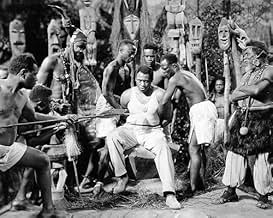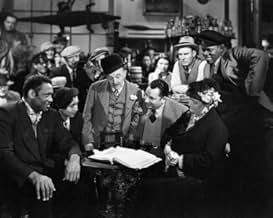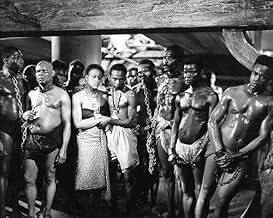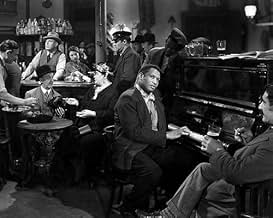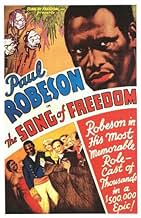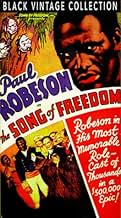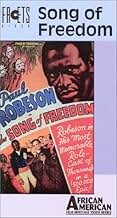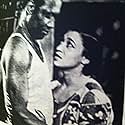A black British dockworker named Johnny Zinga becomes a famous singer and learns that he is the rightful king of the African island of Casanga.A black British dockworker named Johnny Zinga becomes a famous singer and learns that he is the rightful king of the African island of Casanga.A black British dockworker named Johnny Zinga becomes a famous singer and learns that he is the rightful king of the African island of Casanga.
Elisabeth Welch
- Ruth Zinga
- (as Elizabeth Welch)
Bernard Ansell
- Sir James Pyrie
- (as Bernerd Ansell)
Cornelia Smith
- Queen Zinga
- (as Miss C. Smith)
Sydney Benson
- Gate-Keeper
- (uncredited)
Cathleen Cavanagh
- Woman
- (uncredited)
Alf Goddard
- Alf, the Bartender
- (uncredited)
Featured reviews
This film made Paul Robeson proud, and it also garnered high approval from leading black intellectuals at the time, such as Langston Hughes. In its first half it's very easy to see why. The story is far-fetched, but it shows black people as regular folks amongst the working-class of London, without stereotypes, and the desire on the part of one of them (Robeson) to find out where his ancestors were from. In flashing through a couple of centuries, it also showed a sample of some of the horrors of slavery, and we see a clear link to how that caused Robeson's character to be tragically disconnected from his past.
Hearing Robeson perform six songs was quite a treat, and 5-stars on its own. The second, "Sleepy River," which we see with a montage of people listening to his wonderful voice at night, is particularly stirring. Meanwhile, Elisabeth Welch is such a cutey pie as his wife, and more importantly, she's also a real person and not some mammy/servant stereotype. We even get to hear her reprise the song "Sleepy River" at the end, which was wonderful.
The film falters a bit in its second half when Robeson's character makes his way back to his ancestral island, and discovers it run by superstitious, backward people. The characterization felt troublesome, particularly since Robeson seeks to improve their life with the advances he's learned growing up in a European culture, one the film shows to be superior in every respect. On the other hand, at least it's a black man who has come to do this, and a strong, talented, intelligent black man at that. There is something moving at the heart of wanting to find your ancestral land, and to help the people living there.
I might have knocked my rating down a bit because of the problematic bits, or because the interaction Robeson has with the Africans seemed so implausible, but I kept in mind the film was made in 1936. The contrast of Robeson and Welch's characters to what was being spewed out in Hollywood at the time for African-Americans is striking, and undeniable. I enjoyed watching them here, and for the film's musical numbers and the progress it represented, was glad I saw this.
Hearing Robeson perform six songs was quite a treat, and 5-stars on its own. The second, "Sleepy River," which we see with a montage of people listening to his wonderful voice at night, is particularly stirring. Meanwhile, Elisabeth Welch is such a cutey pie as his wife, and more importantly, she's also a real person and not some mammy/servant stereotype. We even get to hear her reprise the song "Sleepy River" at the end, which was wonderful.
The film falters a bit in its second half when Robeson's character makes his way back to his ancestral island, and discovers it run by superstitious, backward people. The characterization felt troublesome, particularly since Robeson seeks to improve their life with the advances he's learned growing up in a European culture, one the film shows to be superior in every respect. On the other hand, at least it's a black man who has come to do this, and a strong, talented, intelligent black man at that. There is something moving at the heart of wanting to find your ancestral land, and to help the people living there.
I might have knocked my rating down a bit because of the problematic bits, or because the interaction Robeson has with the Africans seemed so implausible, but I kept in mind the film was made in 1936. The contrast of Robeson and Welch's characters to what was being spewed out in Hollywood at the time for African-Americans is striking, and undeniable. I enjoyed watching them here, and for the film's musical numbers and the progress it represented, was glad I saw this.
10PWNYCNY
This movie is about how sheer chance and pure luck and can lead to fame and fortune. Paul Robeson is wonderful. His singing is comparable to that in the 1936 Show Boat, arguably the greatest musical ever made by Hollywood. Paul Robeson is such a commanding presence in this movie that without him this movie could not be made. Also the story is compelling as a man has a chance to fulfill his dream and in the process learn more about himself and his roots. Anyone who gives any thought to their own roots can relate to this movie. It's about a man's quest for cultural and spiritual fulfillment which this movie mots effectively portrays. Also impressive is Elizabeth Welch who plays Mr. Robeson's wife. A good story, well acted, excellent, inspirational songs, all combined to create a great movie.
This Hammer Studio, from London, England which is famous for its horror films surprised me with this great film from 1936 starring Paul Robeson, (John Zinga) who works as a London dock worker and sings songs all the time besides having a great bass voice for the opera and is discovered by a great opera director and producer from London, England. John is always wanting to go to Africa where he came from, but he does not know exactly where he was born, but he still remembers a song which he heard when he was very young. One day John happens to sing this song on stage in an opera performance and this song is recognized by an Englishman who tells him where it comes from and also a charm which John wears around his neck which helped determine its origin. John also has a wife and they both visit this Island and try to introduce themselves to these people and that is when the story gets very interesting. Don't miss this great film from the past, it is a gem in the rough. Enjoy
Although no-one could call this a great movie, it is of compelling historical interest. At a time when Black people in the movies were servants or scoundrels, Paul Robeson portrayed a London dock-worker who is discovered by an impresario and launches a great singing career; after that, he goes to Africa to bring education and enlightenment to the tribespeople.
It's easy to be harsh on this movie; it shows the people of Africa as benighted savages in need of guidance (only this time they get it from Robeson, playing an Afro-cockney). The whole second half plays in tropical-adventure mode, with all the clichés of the 1930s.
But you have to realize that the film's sympathies are with the London dock-workers, black and white; it goes to great lengths to show them treating each other with friendship and respect, and this is the most notable part of the story. Everyone else is a caricature - the impresario, the aristocratic explorer, the witch-doctor, and so on.
Anyone who has a tolerance for 1930s films will quickly realize that this is much better than most of them, and is worth a look for many reasons, not the least is the opportunity to hear Robeson's great singing voice. One curious fact is that this is from Hammer Studios, which later became identified with horror films.
A must see for anyone interested in cinema.
It's easy to be harsh on this movie; it shows the people of Africa as benighted savages in need of guidance (only this time they get it from Robeson, playing an Afro-cockney). The whole second half plays in tropical-adventure mode, with all the clichés of the 1930s.
But you have to realize that the film's sympathies are with the London dock-workers, black and white; it goes to great lengths to show them treating each other with friendship and respect, and this is the most notable part of the story. Everyone else is a caricature - the impresario, the aristocratic explorer, the witch-doctor, and so on.
Anyone who has a tolerance for 1930s films will quickly realize that this is much better than most of them, and is worth a look for many reasons, not the least is the opportunity to hear Robeson's great singing voice. One curious fact is that this is from Hammer Studios, which later became identified with horror films.
A must see for anyone interested in cinema.
Sure, the movie is dated in both technique and appearance. But it does have the great Paul Robeson in the central role as a dockworker and social equal of his white work mates. This is at a time when Blacks in American movies were reduced to either menials or buffoons. In terms of stereotypes, Robeson's non-demeaning role takes some getting used to. But try imagining that powerful presence and commanding voice in anything other than a dignified role. No wonder he was widely viewed as a threat to Jim Crow stereotypes.
Perhaps the film's most interesting aspect is what the Westernized Robeson can do for his benighted tribe of ancestors once he returns to them, uninvited. Sure, he can bring those sanitation and medical advances that will improve their collective health. The movie does a pretty good job of dramatizing that aspect, and we're all rooting for him to win out over the tribe's non-scientific methods and the witch- doctor power structure keeping them in place. But what happens after that. Of course, the movie stops at that point, so we don't know. But we do know another area of the continent has been opened to Western presence. The question then is whether Robeson will also bring in Western commercial interests, of much more dubious benefit than the proved health benefits, as history shows. After all, penicillin is one thing, Chevron is another. This remains a point to ponder now that the movie has set up the initial stage.
Despite its shortcomings (the outrageously fey Donizetti, for one), the movie remains an interesting artifact of its time, especially for Robeson's and other Blacks' acceptance into the white working class of London's docks. I'm sure the leftist Robeson found that labor- solidarity aspect particularly appealing. Then too, Elisabeth Welch delivers a fine natural performance as Robeson's loyal wife. We root for the two of them just as we would root for a courageous white couple. Above all, however, the film remains a chance to view one of America's noblest forgotten figuresthe great Paul Robeson.
Perhaps the film's most interesting aspect is what the Westernized Robeson can do for his benighted tribe of ancestors once he returns to them, uninvited. Sure, he can bring those sanitation and medical advances that will improve their collective health. The movie does a pretty good job of dramatizing that aspect, and we're all rooting for him to win out over the tribe's non-scientific methods and the witch- doctor power structure keeping them in place. But what happens after that. Of course, the movie stops at that point, so we don't know. But we do know another area of the continent has been opened to Western presence. The question then is whether Robeson will also bring in Western commercial interests, of much more dubious benefit than the proved health benefits, as history shows. After all, penicillin is one thing, Chevron is another. This remains a point to ponder now that the movie has set up the initial stage.
Despite its shortcomings (the outrageously fey Donizetti, for one), the movie remains an interesting artifact of its time, especially for Robeson's and other Blacks' acceptance into the white working class of London's docks. I'm sure the leftist Robeson found that labor- solidarity aspect particularly appealing. Then too, Elisabeth Welch delivers a fine natural performance as Robeson's loyal wife. We root for the two of them just as we would root for a courageous white couple. Above all, however, the film remains a chance to view one of America's noblest forgotten figuresthe great Paul Robeson.
Did you know
- TriviaPaul Robeson performs a scene from Louis Gruenberg's operatic version of "The Emperor Jones". He earlier had starred in Eugene O'Neill's original play on Broadway (1923) and in the film version The Emperor Jones (1933).
- Quotes
Gabriel Donozetti: What's the matter the color of his skin, when he has color in his voice! Power! Beauty! I go fighting!
- ConnectionsFeatured in That's Black Entertainment (1990)
Details
- Release date
- Country of origin
- Languages
- Also known as
- Un trono por una canción
- Filming locations
- Production company
- See more company credits at IMDbPro
- Runtime
- 1h 20m(80 min)
- Color
- Aspect ratio
- 1.37 : 1
Contribute to this page
Suggest an edit or add missing content

